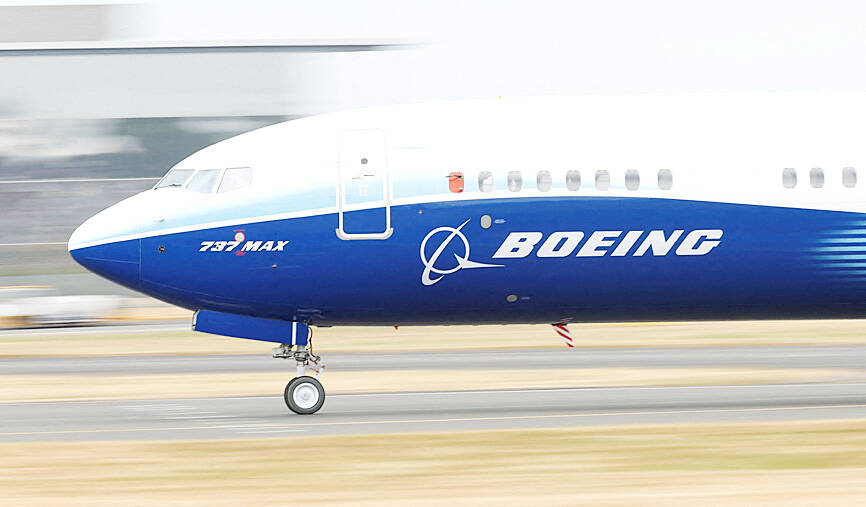Boeing Co yesterday said it had reached a deal with the US Department of Justice (DOJ) over two fatal 737 MAX crashes, which court papers showed would see the aviation giant plead guilty to fraud.
The agreement comes after prosecutors concluded that Boeing flouted an earlier settlement addressing the disasters, in which 346 people were killed in Ethiopia and Indonesia more than five years ago.
“We have reached an agreement in principle on terms of a resolution with the justice department, subject to the memorialization and approval of specific terms,” Boeing said in a statement.

Photo: Reuters
Court papers filed on Sunday in Texas said the company had agreed to plead guilty to “conspiracy to defraud the United States” during the certification of MAX airplanes.
Boeing would be fined under the deal and must invest a minimum of US$455 million in “compliance and safety programs,” while compensation for families would be determined by the court.
Boeing’s latest legal predicament was triggered by a justice department determination in mid-May that the company ignored a 2021 deferred prosecution agreement (DPA) by not meeting requirements to improve its compliance and ethics program after the MAX crashes.
Families of MAX victims were “highly disappointed” by the deal reached between Boeing and the justice department, an attorney at Clifford Law Offices representing them said.
“Much more evidence has been presented over the last five years that demonstrates that the culture of Boeing putting profits over safety hasn’t changed. This plea agreement only furthers that skewed corporate objective,” Clifford senior partner Robert A. Clifford said in a statement.
The families would ask the court to reject the plea deal at an upcoming hearing, an opposition filed by their legal team showed.
The original DPA was announced in January 2021, over charges that Boeing knowingly defrauded the US Federal Aviation Administration during the certification of the MAX. The agreement required Boeing to pay US$2.5 billion in fines and restitution in exchange for immunity from criminal prosecution.
A three-year probationary period was set to expire this year, but in January, Boeing was plunged back into crisis mode when a 737 MAX flown by Alaska Airlines was forced to make an emergency landing after a fuselage panel blew out mid-flight.
In a May 14 letter to the US court, DOJ officials said that Boeing breached its obligations under the DPA by “failing to design, implement, and enforce a compliance and ethics program to prevent and detect violations of the US fraud laws throughout its operations.”

Nvidia Corp’s demand for advanced packaging from Taiwan Semiconductor Manufacturing Co (TSMC, 台積電) remains strong though the kind of technology it needs is changing, Nvidia CEO Jensen Huang (黃仁勳) said yesterday, after he was asked whether the company was cutting orders. Nvidia’s most advanced artificial intelligence (AI) chip, Blackwell, consists of multiple chips glued together using a complex chip-on-wafer-on-substrate (CoWoS) advanced packaging technology offered by TSMC, Nvidia’s main contract chipmaker. “As we move into Blackwell, we will use largely CoWoS-L. Of course, we’re still manufacturing Hopper, and Hopper will use CowoS-S. We will also transition the CoWoS-S capacity to CoWos-L,” Huang said

Nvidia Corp CEO Jensen Huang (黃仁勳) is expected to miss the inauguration of US president-elect Donald Trump on Monday, bucking a trend among high-profile US technology leaders. Huang is visiting East Asia this week, as he typically does around the time of the Lunar New Year, a person familiar with the situation said. He has never previously attended a US presidential inauguration, said the person, who asked not to be identified, because the plans have not been announced. That makes Nvidia an exception among the most valuable technology companies, most of which are sending cofounders or CEOs to the event. That includes

INDUSTRY LEADER: TSMC aims to continue outperforming the industry’s growth and makes 2025 another strong growth year, chairman and CEO C.C. Wei says Taiwan Semiconductor Manufacturing Co (TSMC, 台積電), a major chip supplier to Nvidia Corp and Apple Inc, yesterday said it aims to grow revenue by about 25 percent this year, driven by robust demand for artificial intelligence (AI) chips. That means TSMC would continue to outpace the foundry industry’s 10 percent annual growth this year based on the chipmaker’s estimate. The chipmaker expects revenue from AI-related chips to double this year, extending a three-fold increase last year. The growth would quicken over the next five years at a compound annual growth rate of 45 percent, fueled by strong demand for the high-performance computing

TARIFF TRADE-OFF: Machinery exports to China dropped after Beijing ended its tariff reductions in June, while potential new tariffs fueled ‘front-loaded’ orders to the US The nation’s machinery exports to the US amounted to US$7.19 billion last year, surpassing the US$6.86 billion to China to become the largest export destination for the local machinery industry, the Taiwan Association of Machinery Industry (TAMI, 台灣機械公會) said in a report on Jan. 10. It came as some manufacturers brought forward or “front-loaded” US-bound shipments as required by customers ahead of potential tariffs imposed by the new US administration, the association said. During his campaign, US president-elect Donald Trump threatened tariffs of as high as 60 percent on Chinese goods and 10 percent to 20 percent on imports from other countries.